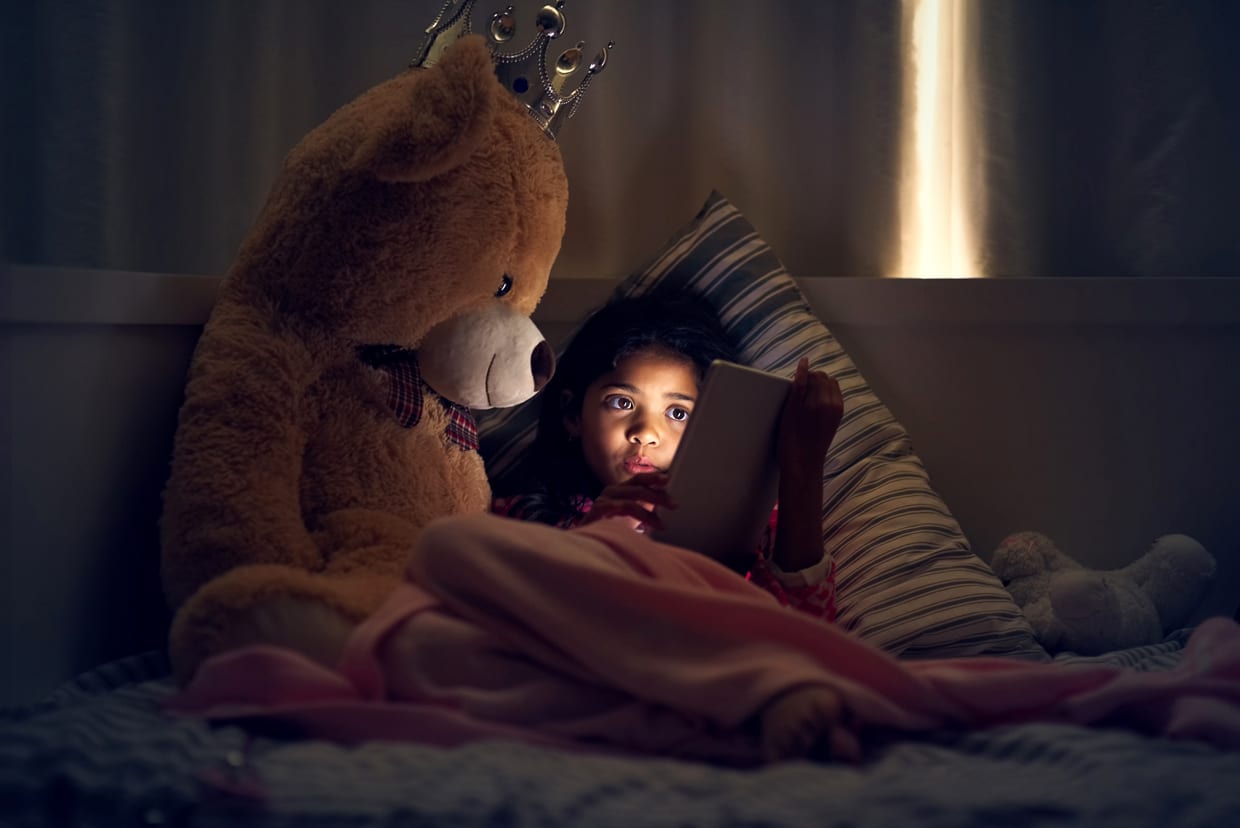We spend more than 11 hours a day interacting with media — whether that is a desktop, phone, TV, tablet, etc. — market research group Nielsen reports. But the concern is rising as to whether this is healthy for younger generations. The graduate students of the Fashion Institute of Technology’s Cosmetics and Fragrance Marketing and Management degree program released a report with findings that technology is detrimental to early-childhood brain development. The report states that “Neurodegeneration, usually observed in the brain of an elderly person, is now occurring in the developing brain of an adolescent.”
And because of that, a new parenting field is slowly emerging: screen-free parenting. Today, families are hiring parenting coaches to help them remember what raising children without screens used to be like.
Screen consultants and coaches come into schools and homes to teach parents not solely what to do, but how to do it. “It’s impossible now to use traditional parenting strategies because [kids] are so hooked to the screen,” says Gloria DeGaetano, Seattle-based parenting coach and founder of the Parent Coaching Institute, which is a network of 500 coaches and a training program. “When parents come to me, their lives are a living hell, their kids are totally out of control, etc. So it’s not just about saying, ‘go kick a ball outside’ is about building the parent’s strength and confidence, not just about given them a temporary solution.” In her parent coaching [program], they have a three-month plan where they work with the parents weekly to develop a family-media plan and different ways to set boundaries. “Training is involved in parenting, and we’re missing out on that. A parent is an educator that can give the child specific on expectations. A lot of awful behavior can be avoided or at least diverted a lot quicker. ”
So, we sat down with DeGaetano to understand what screen-free parenting is all about and get her tips and tricks as to how to wean kids off their screens.
Q: When is it OK to give your kids phones? For what amount of hours?
I am an advocate of giving kids ages 8-16 a flip phone (NOT a smartphone) if parents deem it important for safety issues. There is no reason or purpose for optimal child and teen development for kids to have access to the internet 24/7. At age 16, around the time of driver’s licenses, the maturity of the teen can be assessed and parents can then decide if he/she can now handle a smartphone.
Q: How do you think families are impacted by screens?
Families are disintegrating. There isn’t time to live and to be with each other and it’s almost like we’re forgetting how to live with children, and that they are members of the family and can contribute to doing things.
Q: Why is it important to minimize screen time? Is it fine to use the phone in front of kids?
When we are giving children and teenagers that much time on screen, it’s really not allowing their brains to develop properly. We’re limiting their opportunities as full, self-actualized human beings. It’s tricky because when we’re in a tech society that’s pushing iPads to kindergarten kids, so parents are alone in the desert trying to set some boundaries, but we have to still meet the developmental needs of our kids. If the child is on the screen and it’s supporting their thinking and they want to do other things beside be on the screen, then that’s really great. But we can’t replace the world for our kids. There are many things that the brain, mind and body need to do in this concrete, sensory reality. It’s so critical for optimal functioning.
I was coaching a mom, and at the time, Minecraft was all the rage for her 8-year-old. Even when she started getting him off incrementally, he would still throw a tantrum. We started doing 15 minutes less and that seemed to help, but what really helped was he liked to do LEGOs before Minecraft, and she came up with the idea of him doing LEGOs with the characters in Minecraft, or create the Minecraft world in her living room. I thought it was a great idea. That got him interested to get off.

Q: What are the challenges parents face in raising kids screen-free?
Everyone is vulnerable. We see adults checking their phones 300 times a day, and this is called intermittent reinforcement. This type of reinforcement keeps us going back if we don’t learn to discipline ourselves. And then, the younger the child is, the more vulnerable they are to images. The more time kids spend and the earlier [in their lives] the harder it is to get them off.
Q: How can parents be better role models?
Sometimes, I feel like when articles are written they place all the blame on the parents. The parent is overwhelmed and it’s understandable. They’ll use that smartphone as a built-in baby sitter. We need to help them understand that that’s only going to make their lives worse and more interaction with the child is going to make their lives better.
So there’s this important balance that parents can understand to model, that the child needs autonomy to play by themselves, so it’s OK to do your knitting or whatever — I would read a book — and then when going ‘mommy, look at this,’ then look up and talk to them.
That attentive response in a digital age is definitely a challenge but necessary. It models to the child two important things: I’m here for you whenever you need me, and I’m going to set a boundary because I’m a parent and I have other important things besides talking to you. I’m a human being, I’m going to do other things and you can handle it. You’ve developed your autonomy.
Q: What are some other ways parents can foster better communication habits in their kids?
1. Audio stories, audiobooks. My background is in psycholinguistics, so I know the value of language and its relationship to thinking. For young children, for instance, it’s so important because not only it gets to their use of the imagination, but it supports the child to follow along in an audio way. They’re predicting outcome because they’re thinking to themselves, “What’s going to happen next?”
2. Talk to the child about what media is to them — why do they like the video game so much, mute the commercials when watching a show together, and talk about what we just saw and what’s coming next. I totally believe that we need to support the thinking processes of our children, and talk to them about why they’re taking in the images, why it’s important to them, how these apps or commercials are trying to manipulate them, etc.
3. Have a family gathering or meeting, that can be every other week or whatever. This is a time where the child knows we’re going to talk about what went well this past week, whether we were successful in keeping to our media plan, or looking back and celebrating the successes, etc. and then looking forward to the schedule of the upcoming week: travels, soccer practices, tests, etc. What we’re doing is putting some structure in place. Sunday afternoon has always been a good time for the parents.
4. Use the tech to support their child’s learning process, but in fun ways. We find that getting takeout on a Friday night and watching a documentary or an educational show or “Planet Earth” … then just something mindless is a great way to go into the weekend.
We only recommend products we have independently researched, tested, and loved. If you purchase a product found through our links, Sunday Edit may earn an affiliate commission.








